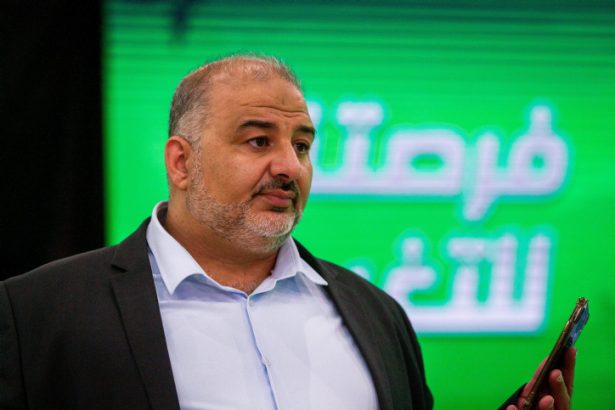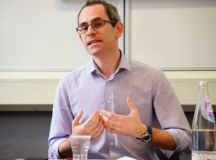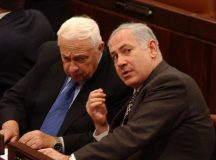Arab political parties have become central players in Israeli politics. But how has a young dentist turned politician from the Islamic Movement come to hold the keys to determine the next Prime Minister? Fathom Deputy Editor Calev Ben-Dor maps out the trends that have brought the country to this juncture.
Israeli elections over the years have sprung their fair share of shocks and surprises. In 1996, the public ‘went to bed’ with Shimon Peres as the next Prime Minister only to ‘wake up’ with Benjamin Netanyahu who won by fewer than 30,000 votes; in 2006 the recently formed Pensioners Party famously won seven Knesset seats. And in April 2019, the New Right party headed by Naftali Bennett and Ayelet Shaked failed to cross the electoral threshold by a mere 1400 votes, thus depriving Netanyahu of the coalition he so craved (and continues to crave). Yet for pure drama, symbolism and potential significance, few events can compare to the head of an Islamic party, a shopkeeper’s son from a small Galilee village, potentially determining the next Israeli prime minister.
Yet with all ballots counted, this is where Israelis find themselves. Netanyahu’s preferred coalition of Likud, the ultra-Orthodox, the Religious Zionist party (including its Kahanist wing) and Naftali Bennett only has 59 seats, two short of forming a coalition. The anti-Netanyahu factions – comprised of New Hope, Yesh Atid, Blue and White, Yisrael Beiteinu, Labour, Meretz and the Arab Joint List – are also short of the magic number. In the self-declared non-aligned camp lie two parties. One is Bennett’s right-wing Yamina party with seven seats. The other, the United Arab List, known as Raam, with four seats. Led by Mansour Abbas, it has expressed its openness to supporting either Netanyahu or the centre-left. The party’s choice will be crucial to the future of Israeli politics.
Abbas was trending on twitter in Israel with over 2000 related tweets in the 24 hours following the election. In an interview on Radio 103 FM he framed his party as crucial to coalition building. ‘Whoever wants to prevent fifth elections will need to be in touch with Raam. But support won’t come free of charge’ Abbas emphasised. ‘In return for political stability that will allow for the establishment of a government, we will need to receive things for the benefit of Arab society.’ Yair Lapid, who heads the second largest party, met Abbas over the weekend.
‘We want to influence’
The evolution in the political power and influence of the Arab community in Israel is something Ron Gerlitz, Executive Director at the aChord Centre: Social Psychology for Social Change and an expert in Jewish-Arab political partnership, described as the ‘most dramatic change in Israeli politics’. ‘The legitimacy of establishing a government based on political power of Arabs is now an option which is dramatically being promoted by the head of centre party (Lapid),’ Gerlitz said during a phone conversation on election day. ‘We could never envision this would be the scenario. We thought it was a generation long struggle to legitimise Arab citizens.’
How did we get here?
Arab society has traditionally divided into four political groups. Arab-Jewish non-Zionist such as the Communist party Hadash; Islamic, such as Raam; Palestinian-Arab Nationalist, such as the Ta’al and Balad parties; and Arab-Israeli, which traditionally votes for Zionist parties such as Meretz (and others).
For several years, there has been widespread support for Arab parties entering Israeli governing coalitions with a 2019 poll by Sicha Mekomit showing 87 per cent held this view. But whether for reasons of ideological purity, or being considered past the pale, Arab parties stayed out or were excluded from coalitions.
Arab society has suffered from discrimination and lack of resources over the years. But its leadership didn’t always endear itself to the Jewish majority. There were of course the deep disagreements over the Israeli-Palestinian conflict and the nature of Israel as a Jewish and democratic state. But there were also more symbolic and deeply damaging events: The former leader of Balad, Azmi Bishara, was accused of spying for Hezbollah during the Second Lebanon War and fled Israel (he now resides in Qatar); Balad MK Hanin Zouabi labelled IDF soldiers as murderers; another Balad MK, Basel Ghattas, was incarcerated after being convicted of smuggling phones to jailed terrorists. The Arab Joint List criticised a decision by the Gulf states to define Hezbollah as terrorist organisation and decided against attending the funeral of Shimon Peres (even Palestinian Authority President Mahmoud Abbas attended). None of these made it easier to facilitate Jewish-Arab political partnership.
The rise (and glass ceiling?) of Odeh-nism
It is difficult to pinpoint the exact moment that things began to change. But first some electoral history. Before the April 2019 election (Round 1), the Joint List, which had gained 13 seats in the 2015 elections, split and ran as two parties: Balad and Raam on the one hand, and Ta’al and Hadash on the other. Beset by depressed voter turnout (49 per cent in national elections compared to 84 per cent in municipal elections), both lists floundered. Balad and Raam barely scraped over the threshold to gain four seats. Hadash and Ta’al gained six.
Less than a month before the next elections in September (Round 2), the leader of the then reconstituted Joint List, Ayman Odeh, sat down with leading Israeli journalist Nahum Barnea in Tel Aviv for what would become an explosive interview. Published on 23 August, and using quotes from famous Israeli singer Arik Einstein, Odeh explained that he wanted to move Arab politics in Israel ‘from a position of protest to one of influence’. He expressed his willingness to support the government from outside and to recommend Blue and White leader and former IDF Chief of Staff Benny Gantz as Prime Minister.
The interview was considered a bombshell, but Odeh had intimated this direction for a while. When I sat down with him for a Fathom interview in his Knesset office in April 2017, he said one of the Joint List’s priorities was to convince the Zionist Left that it will be impossible to make important changes without Arab parties. ‘If issues of peace, democracy and social justice are important to the centre-left’ Odeh said, ‘they have to make us partners’. When asked whether he could imagine a scenario in which he would join a coalition government, Odeh responded cautiously. He reiterated that there was broad agreement in Arab society that the ‘Rabin era’ – when Arab parties provided a technical blocking majority (not dissimilar to the 2017 Conservatives and DUP ‘confidence and supply’ agreement) that prevented the government from falling – was the best parliamentary period in the history of the State for Arabs. Carefully choosing his words, Odeh told Fathom that ‘a scenario in which there would be the possibility of a government being formed that genuinely supported peace and equality, and it would depend on us whether it would come to power or the right would continue, I don’t think we should stand aside and say we’re not interested’. ‘I think we would want to influence’ he said, ‘and one model would be a return to the situation from the 90’s with Rabin’.
Odeh also told Barnea his political shopping list: entering negotiations to end the occupation; cancelling the Jewish nation-state law; the establishment of a new Arab city; an end to the demolition of Palestinian homes in the West Bank; stricter enforcement of gun laws in Arab society; and the establishment of an inter-governmental team to combat the high crime rates in Arab towns.
Odeh was criticised by his Joint List colleagues for the interview, with Balad describing it as unfortunate and wretched. But the interview gave birth to what consultant, researcher, and theorist Ameer Fakhoury termed Odeh-nism, in other words, ‘the founding moment in which Palestinian citizens of Israel demand to join and begin to actively pursue joining the political Israeli community’.
Odeh-nism was popular amongst the Arab public (it also increased the number of Jewish voters for the Joint List from 5,000 to 50,000 between election rounds 1 and 3). A month later, in the September elections (Round 2), Arab voter turnout rose 10 per cent to 59.2 per cent and the reconstituted Joint List won 80 per cent of the votes in Arab locals, gaining 13 seats. In a historic move, three of the four parties within the Joint List (barring Balad) recommended Gantz for Prime Minister. In a tweet that moved many Israelis, Odeh quoted Psalms, 118:22: ‘The stone which the builders refused has become the founding stone.’
The Arab parties – for so long ignored by the mainstream establishment – were becoming serious players on the political field.
In the March 2020 elections (Round 3), the Joint List further increased its electoral strength. Turnout jumped again, this time to 64.8 per cent, and the party received an additional 100,000 more votes (from 470,211 in September to 581,507 in March), winning a historic 15 seats. They subsequently entered serious negotiations with Blue and White – not only over recommending Gantz but over the potential to support his coalition from outside (like in the Rabin era).
Electoral maths makes the Centre-Left change direction
The change in approach didn’t just come from Odeh but from the Jewish Zionist centre-left. After Round 2, Blue and White began to realise that the only way to replace Netanyahu was via cooperation with the Joint List. Former senior Yesh Atid MK Ofer Shelach, who was subsequently involved in negotiations with the Joint List, related that Blue and White initially said two contradictory things – that they wouldn’t go into government with Netanyahu nor into government with the Joint List. Mathematically one generally has to do one or the other (certainly without ultra-Orthodox support which comes with its own electoral and coalitional complications). ‘Blue and White will likely represent a short episode in Israeli politics’ Gerlitz suggests, ‘but the change of opinion by their leadership quartet [which included three former chiefs of staff] has left a legacy of legitimising government based on political power of Arab citizens via the Joint List’. For Gerlitz, if the centre-left ever returns to power, it will be because of this legacy. ‘That’s the breakthrough and it will affect Israeli politics for years.’
Negotiations between Blue and White and the Joint List bore fruit and agreements were reached over several issues on Odeh’s shopping list in return for outside support for the government. Yet at the peak of its potential influence, everything collapsed. Some Blue and White MKs refused to countenance a minority government with Joint List backing. With the Coronavirus in full swing, and the path to the premiership seemingly blocked, Gantz ultimately entered a unity government with Netanyahu. With high expectations came harsh disappointment on behalf of the Arab public. Through no fault of its own, the Joint List had failed in its attempt to influence. Odeh-nism had hit a brick wall.
Mansour Abbas and the ‘Shas Model’
Odeh had crossed the political Rubicon, but his mast had been firmly tied to the Zionist Left. ‘When Odeh said he wanted to influence Israeli society, it was in a particular direction’ Fakhoury explained in a phone conversation.
Enter stage left (or perhaps more accurately stage right) Mansour Abbas, a 46-year-old dentist and Hebrew University graduate, and head of Raam, the representative of the Islamic Movement within the Joint List. The Islamic movement in Israel evolved out of the thought of the charismatic Sheikh Abdullah Nimar Darwish who, after years in prison, rejected political violence and military jihad and concluded that the movement must ‘work in the state of Israel by Islamic values without breaking the law’. Citizenship came to be considered a social pact with the Jewish state and given a religious foundation. In his 2014 Brookings paper ‘Islamic Political Activism in Israel’, Lawrence Rubin explains that while it ‘shares many features with other Islamic movements in the region’ one major difference is that ‘the Israeli Islamic movement operates in a context in which there is no chance for it to acquire state power … Thus, unlike neighbouring movements, [it] could not justify its participation as a means to control state power; rather, it must argue participation and thus de facto legitimisation is a means to better the community of Palestinian citizens of Israel.’
In 1996 the movement split over the question of participation in national (rather than municipal) elections in the Jewish state. Less a narcissism of small differences than a religious-ideological debate over what Rubin terms ‘Islam sanctioned participating in a democracy, in which the majority could decide moral-legal issues’, the Northern Branch developed into an extra-parliamentary movement whose members boycott Knesset elections. Continuing the path of Darwish, the Southern Branch became a parliamentary movement that ran candidates for the Knesset, and which is now represented by Raam. The party is both ideologically Islamist and politically pragmatic.
Abbas adopted a strategy – which he subsequently used for the March 2021 election (Round 4) – of not being ‘in the pocket of the right or the left’. In a long Facebook post in October 2020, Abbas argued that he wasn’t afraid to introduce what he termed a ‘pragmatic new political style’. ‘I have not inherited incorrect political concepts based on dividing the “right” and “left” of the Israeli political map, as if the largest role we can expect is to be a reserve force for the so-called ‘Zionist left’ he wrote. In Abbas’s words (and most would agree with his diagnosis even if not his prognosis), the left in Israel is ‘extremely weak and on the brink of extinction. The right holds the reins of power and it appears entrenched there for years to come’. In light of this, Abbas rhetorically asked, ‘What can we do as Arab parliamentarians? Do we wait for the next resurrection of the left?’ ‘We need to decide whether we’re going to serve our community or just grandstand.’
Abbas’ strategy was somewhat modelled on that of the Jewish ultra-Orthodox parties, who show a willingness to enter coalitions (theoretically of both left and right although in recent years it has primarily been right) based on whether their core interests are met. In mid-November, during an interview with Lucy Aharish, Abbas detailed his thinking: ‘We won’t succeed in playing the game the Charedim play. But in my view at least to try to be part of the game, to try to influence.’ Indeed, in an interview with Channel 12, Abbas talked up the ‘Shas model’ suggesting he was closer to the right than the left: ‘What do I have in common with the left? In foreign policy I’m with them, of course – we support the two-state solution. But on religious affairs I’m right-wing. I have a lot more in common with Shas and United Torah Judaism than with Meretz and Blue and White.’ Most controversially for many in Arab society, Abbas didn’t rule out supporting Netanyahu and was thought to have cooperated with him on specific issues. Shas was a pertinent example. Now tripping over itself to express loyalty to Netanyahu and the ‘national camp’, the party has historically been happy to partner in the centre-left governments of Rabin, Ehud Barak, and Ehud Olmert.
Odeh to Abbas – Evolution or Mutation?
If Odeh’s interview was a bombshell, Abbas’ comments – as well as his perceived flirtation with Netanyahu – constituted the equivalent of the nuclear option to the Joint List, which ultimately split. Mohammed Darawshe, a political analyst and Director of the Center for Equality & Shared Society at the Givat Haviva Institute, was highly critical of Abbas and his ‘Shas model’. In a conversation the day after the election (while busy searching for the 200,000 votes lost by Arab parties ‘this is the mega story of the election’ he noted) Darawshe termed the strategy ‘a new brand of Arab political opportunism’. ‘Basing himself on a type of “shuk perspective”’ Darawshe argued, Abbas ‘used a rationale of “why do we care if Netanyahu goes to jail or not if we can get things from him?” If this came from any other Arab politician apart from one with religious backing, he would have been called a traitor.’
Yet while the Joint List were highly critical of Abbas’ strategy, wasn’t he in some way just expanding Odeh’s strategy? ‘Odeh paved the path for Abbas’ Israel Democracy Institute’s Dr. Arik Rudnitzky told Fathom. ‘A centre-left government isn’t on the horizon so why not play the full game?’ In other words, once a decision is made to move from a path of protest to one of influence – as Odeh proposed – it seems only natural to be willing to play the game properly and be open to supporting a right-wing government. Fakhoury, who disagrees with the ‘Shas model’ still sees the logic behind Abbas’ move. ‘Whether one agrees with him or not, it’s impossible to say it’s a crazy strategy because it’s not.’
Odeh and Abbas both changed the debate over Arab involvement in the Israeli political system. ‘The question is no longer whether you are getting off the bench in order to play, but rather where on the pitch you are playing’ says Fakhoury. It helped that the conservative and religious Abbas – unlike Odeh – was never really part of the left and its values of equality and feminism (one reason the Joint List split was due to disagreements over a Knesset bill on LGBT rights). This also gave Abbas greater political flexibility in choosing his party’s next move.
Fakhoury says it is unclear whether Abbas’ strategy represents a natural evolution of Odeh-nism or a mutation of it. ‘Abbas is no less a Palestinian patriot than Odeh, but he’s willing to de-prioritise the national question. He knows it’s not currently on the agenda.’ Nimrod Nir, a researcher at aChord and a strategic consultant who worked with the Joint List in recent years, told Fathom that Abbas’ strategy differs from Odeh’s because the Hadash leader’s policy was based on Jewish-Arab partnership whereas Abbas’ model – to paraphrase the late intellectual and politician Tawfiq Ziad on Jewish-Arab coexistence in Israel – is like the partnership between the donkey and its rider. ‘Unlike Odeh, Abbas is purely instrumental – he’ll go with whoever pays the most. It’s the difference between political partnership and political blackmail’ says Nir.
Yet Abbas is also different to what one might expect from an Islamist. Eran Singer, a commentator on Arab society in Israel who hosts a popular weekly radio show on Arab affairs, spent election day with Abbas in his village of Maghar. Singer told Fathom that ‘Abbas is not a regular Islamist nor is his perspective solely through the lens of the Islamist Movement’. Part of this perspective comes from his background. Maghar is a majority Druze village where Muslims comprise 20 per cent. Number two on the list is Mazen Ghanayem, a former footballer and not super religious former mayor of Sakhnin. Hardly a classic candidate of a strictly Islamist party.
In any event, Abbas’ strategy seems to be broadly supported. A recent survey carried out by the Konrad Adenauer Program for Jewish Arab Cooperation at the Moshe Dayan Centre in Tel Aviv University, found 46 per cent of respondents are happy to join any government, in contrast to 18 per cent who specified it only be a centre-left one (an additional 21.3 per cent supported the ‘Rabin era model’).
Abu Yair’s Charm Offensive
Supplementing Odeh-nism, the centre-left’s realisation that it needed Arab political support, and Abbas’ ‘Shas model’ is another, surprising factor – Netanyahu himself and his so-called charm offensive within Arab society.
For many years, Netanyahu aimed to weaken the electoral strength of the Arab parties. Gerlitz argues that, ‘Netanyahu understood the only way that the left can be in power was through it re-forming the Rabin coalition [outside Arab support]. That’s why he aimed to delegitimise them.’
Yet it didn’t work. Voter turnout increased. The Joint List grew. With necessity the mother of invention, Netanyahu came up with a new approach. Thus was born the ‘Abu Yair, Kulana Maek’ (we’re all with you father of Yair [Netanyahu] i.e. Benjamin). The Prime Minister crisscrossed the country speaking to Arab audiences, encouraging them to vote Likud. Three huge billboards with Abu Yair were placed in the heart of Wadi Ara, the largest Arab population centre in Israel. The ‘Arab vote’ suddenly became an asset different Jewish parties were battling over.
The tangible fruits of Netanyahu’s strategy seemingly didn’t account for much with data estimating Likud votes in Arab locales at 21,500, the equivalent to just over half a seat. But Darawshe believes this wasn’t really the point of Netanyahu’s exercise. Rather, his real strategy – weakening the Joint List – was actually very successful. ‘He managed to delegitimise the Joint List and tar them as lacking influence, he managed to divide the Joint List (with Abbas leaving) and he managed to frame the Arab parties as being responsible for the lack of Jewish-cooperation.’
The Search for 61 – Politics makes strange bedfellows
It has been quite a turnaround for Arab society in general and Mansour Abbas in particular. A year ago, Yair Netanyahu called Raam ‘the Israeli branch of Hamas’. In April 2019, the Likud voted to disqualify Abbas from running in the elections. In September, an automated popup message on the Prime Minister’s Facebook page warned Israelis that ‘Arabs want to annihilate us all – women, children and men,’ adding that ‘Israel mustn’t have a left-wing government that relies on Arabs who want to destroy us all.’ Netanyahu boasted about ‘our forces’ destroying homes in the Arab village of Qalansawe. And on election day in 2015, Netanyahu infamously (and erroneously) warned that the Arabs were being bussed ‘in droves’ to the polling stations.
Yet with Abbas potentially holding the key to continued Likud rule, several right-wing commentators thought to be close to the Netanyahu family are wondering out loud whether it would really be that bad if Likud relied on Raam to stay in power. Likud Minister Tzachi Hanegbi suggested entering negotiations with Abbas’ party. Associates of the Prime Minister told Kan public radio broadcaster that Netanyahu has not ruled out ‘parliamentary cooperation’ with Raam.
One survey even suggests that positions amongst right-wing voters may be changing. According to aChord, between February and December 2020 the number of right-wingers supportive of a government which relied on outside support of the Joint List increased from 9.7 per cent to 15 per cent. Hardly revolutionary numbers, but statistically significant nonetheless.
It raises the question of whether Netanyahu – who desperately needs additional support to stay as prime minister – and Abbas – who is searching for influence – could cooperate. In a TV interview one week before the elections, Netanyahu explicitly committed to not include Raam or rely on them to build a coalition, because they ‘are an anti-Zionist party’. But Singer isn’t particularly impressed by Netanyahu’s promises. ‘So he promised’, Singer quips. ‘It wouldn’t be the first time a politician has lied’. In fact, perhaps their type of potential cooperation reflects the current state of play between Jews and Arabs. ‘Jews and Arabs no longer talk in terms of peaceful resolutions – that’s not currently in our vocabulary,’ Singer explains. ‘But as long as it meets the interests of Netanyahu and Abbas, its fine with both of them to go further, without giving the Israeli or Arab public too much information.’
Netanyahu’s unexpected legacy
Netanyahu is yet to find a manoeuvre that allows him to stay in power that he finds too distasteful or cynical to try. Indeed, before the Knesset was dissolved (after Round 1), when Netanyahu was pummelling the centre-left for considering partnership with the Joint List (who Netanyahu termed ‘those who support destroying the State of Israel’) and when he was warning all who would listen that it was ‘either Bibi or [Ahmed] Tibi,’ Netanyahu’s confidants Natan Eshel and Miki Zohar carried out secret negotiations with Abbas over supporting the government from the outside.
In this case however, the decision may have been taken out of Netanyahu’s hands by his ‘natural’ and erstwhile coalition partners, the Religious Zionist party and its Kahanist component. Bezalel Smotrich completely ruled out any support from Raam, who he termed terrorist-supporters who deny the existence of the State of Israel as a Jewish state. So too, did Itamar Ben-Gvir. A Raam spokesperson meanwhile vowed the party would not sit ‘with racists who threaten us, who threaten Al-Aqsa’. Mutual revulsion between Israel’s far right and Islamists seems to have put pay to Netanyahu’s chances of gaining a majority. It is ironic that, so desperate to bring the Kahanists into Knesset to bolster his coalition making potential, Netanyahu has restricted his political room to manoeuvre.
The deeper irony is that after doing so much to delegitimise the participation of Arab parties, Netanyahu may have helped pave the way for it. There remains deep opposition, including amongst Yamina and New Hope, to Arab non-Zionist party involvement in governing coalitions. But Singer believes that Netanyahu’s charm offensive was influential in terms of koshering the legitimacy of Arab involvement in Israeli politics. ‘Netanyahu was the first to incite against Israel’s Arab citizens and the first to legitimise and nobilise relations with them.’ Nir suggests that Netanyahu is partially responsible for the small increase in support for Arab participation in government amongst the right-wing. ‘Ultimately the moment Netanyahu takes ownership of a particular policy, it becomes the right’s agenda.’ Moreover, he states, ‘the legitimacy the right has given to the potential for Jewish-Arab partnership will, over time, make these parties immune from the negative campaigns against them’.
Where to now for Arab political participation, Abbas’ Shas Model and Odeh-nism? Nir believes that while Abbas’ path was different to Odeh, ‘the repercussions of what Abbas did will take Odeh-nism to the next level’. The fact there are now two different Arab parties, one non-aligned and one closer to the centre-left has caused ‘a re-categorisation of the political discourse in Israel. This is the first time that we’re not speaking about Jews vs Arabs rather about right vs left. What Abbas did was opposed by the Joint List. But his strategy has actually advanced Odeh-nism and its emphasis on Jewish-Arab partnership’.
Arab parties and society have undoubtedly emerged stronger from these elections. ‘Everyone – not just Netanyahu – is now flirting with Arab society’ says Fakhoury, ‘Bennett set up a branch in Arab towns. Lapid is tweeting in Arabic. Meretz have two Arab citizens in their top five. Labour’s number seven is a former spokesperson from Balad’. On election night, political analyst Afif Abu Much said that despite gaining fewer seats, Arab parties have gained in strength, ‘with Abbas holding a key position in determining the composition of the next government’.
The story of course is far from over. With seeming deadlock, coalition building will be a Sisyphean task. Fifth elections remain a distinct possibility. The evidentiary phase of Netanyahu’s trial is due to start in April. Yet if these elections turn out to be one of Netanyahu’s last throw of the dice, his unintentional legitimisation of Arab involvement in government decision making would represent quite the legacy.





































Somebody could usefully research the relations of “Mapai Israel” with Arab voters. I am 80 in September but distinctly remember 50’s and 60’s photos of Yigal Alon and Moshe Dayan campaigning in Galilee(?) Arab villages. They could speak Arabic having grown up in villages with neighbouring Arab villages and Ben Gurion did not (but had Turkish from his student days in Istanbul). This was despite the Arab community being under military government till Eshkol ended that in 1966.